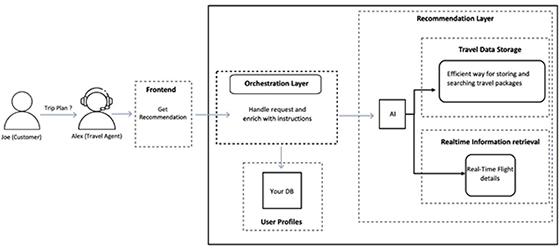
As long as consumers are willing to share lots of personal
information with AI agents, artificial intelligence (AI) from companies like Amazon, Google, Meta, Microsoft, OpenAI, Anthropic and others will plan their trip, pick out and purchase wardrobes, and
automatically tell them how much it will cost to plan and complete the trip.
Amazon Web Services (AWS) on Friday announced a plan to help companies build a generative AI (GAI) solution using
Amazon Bedrock, an Amazon managed service that provides access to GAI foundational models through one API for traditional travel agencies. I believe limiting this process would be a mistake.
The AI boom will change travel, as well as all other sectors that require personalization. The opportunity involves personalizing preferences for all types of markets, from travel and airlines to
clothing manufacturers.
advertisement
advertisement
I also can see automotive brands using this type of technology for road trip travel packages, and perhaps mapping out restaurants to stop at on the way based on food
preferences.
Advertisers will create a new strategy as the evolution of AI agents forces them to shift their focus from only targeting human consumers to influencing AI algorithms.
Amazon’s technology demonstrates how travel agencies can create packages based on customer profiles and preferences with real-time pricing
data.
It demonstrates how to use Amazon Bedrock Knowledge Bases for travel information, Amazon Bedrock Agents for real-time flight details, and Amazon OpenSearch
Serverless, a suite of search and analytics tools, for packaged search and retrieval.
Amazon touts this as a tool for travel agencies, but I see it as a recommendations tool for any company
that is willing to link and match its products to help consumers plan complete travel plans. The merchant can match all types of requirements with real-time flight and accommodation availability.
The AI-powered solution combines personalization with real-time data integration, enabling the company to match accessibility requirements with current travel options, delivering accurate
recommendations in minutes rather than hours.
Amazon’s technology uses a three-layered architecture to personalize recommendations from customer requirements and preferences, with the
ability to process requests using customer data.
The recommendations layer combines two key components. It acts as travel data storage to maintain a searchable repository of travel
packages, as well as real-time information retrieval that fetches current flight details through API integration.
Amazon says this layered approach can capture customer requirements, enrich
them with stored preferences, integrate real-time data, and deliver personalized recommendations that match customer needs. The following diagram illustrates how these components are implemented using
AWS services.
I view this AI agent option as more than travel recommendations. It could link with packages like the Yahoo Creator program, for example, where creators take a
more visible role on Yahoo’s home page to showcase different things -- a dedicated creator vertical with creator content appearing alongside traditional publisher content on the Yahoo app
and in company newsletters.
Yahoo -- which launched the beta program in its News feed in March 2024 -- has more than 100 creators in the program, contributing content across travel,
wellness, food and cooking, parenting, and more. A revenue share model gives creators an opportunity to monetize their content through a 50/50 revenue-share split driven by article
engagement.